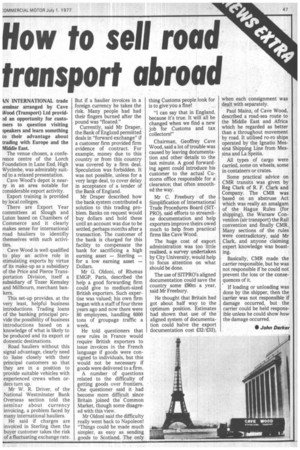Now to sell road transport abroad
Page 49

If you've noticed an error in this article please click here to report it so we can fix it.
kN INTERNATIONAL trade ;eminar arranged by Cave Wood (Transport) Ltd provid ad an opportunity for customers to question visiting speakers and learn something to their advantage about trading with Europe and the Middle East.
The venue chosen, a conference centre of the Lorch Foundation in Lane End, High Wycimbe, was admirably suited to a relaxed presentation.
Cave Wood's depot is neary in an area notable for considerable export activity.
Export training is provided by local colleges.
There are Export Year committees at Slough and Luton based on Chambers of Commerce and it clearly makes sense for international road hauliers to identifiy themselves with such activities.
Cave Wood is well qualified to play an active role in stimulating exports by virtue of its make-up as a subsidiary of the Price and Pierce Transportation Division, itself a subsidiary of Tozer Kemsley and Millbourn, merchant bankers.
This set-up provides, at the very least, helpful business introductions. Trading loans of the banking principal provide the possibility of business introductions based on a knowledge of what is likely to be produced and its export or domestic destinations.
Road hauliers without this signal advantage, clearly need to liaise closely with their principal customers so that they are in a position to provide suitable vehicles with experienced crews when orders turn up.
Mr W. R. Driver, of the National Westminster Bank Overseas section told the seminar about currency invoicing, a problem faced by many international hauliers.
He said if charges are invoiced in Sterling then the buyer customer takes the risk of a fluctuating exchange rate. But if a haulier invoices in a foreign currency he takes the risk. Many people had had their fingers burned after the pound was "floated."
Currently, said Mr Draper, the Bank of England permitted deals in "forward exchange" if a customer firm provided firm evidence of contract. For example, money due to this country or from this country was covered by a firm deal. Speculation was forbidden. It was not possible, unless for a very large deal, to cover delay in acceptance of a tender of the Bank of England.
Mr Draper described how the bank system contributed a solution to this trading problem. Banks on request would buy dollars and hold these until an account was due to be settled, perhaps months after a transaction. The customer of the bank is charged for this facility to compensate the bank for sacrificing a high earning asset — Sterling — for a low earning asset — Dollars.
Mr G. Oldoni, of Rhenus EMGP, Paris, described the help a good forwarding firm could give to medium-sized British exporters. Such expertise was valued; his own firm began with a staff of four three years ago and now there were 80 employees, handling 6000 tons of groupage traffic a week.
He told questioners that new rules in France would require British exporters to issue invoices in the French language if goods were consigned to individuals, but this would not be necessary if goods were delivered to a firm. A number of questions related to the difficulty of getting goods over frontiers.
One questioner said it had become more difficult since Britain joined the Common Market, though some disagreed with this view.
Mr Oldoni said the difficulty really went back to Napoleon!
"Things could be made much simpler, as easy as sending goods to Scotland. The only thing Customs people look for is to give you a fine!
"I can say that in England, because it's true. It will all be changed when we find a new job for Customs and tax collectors!"
Chairman, Geoffrey Cave Wood, said a lot of trouble was caused by leaving documentation and other details to the last minute. A good forwarding agent could introduce his customer to the actual Customs office responsible for a clearance; that often smoothed the way.
Mr C. Freebury of the Simplification of International Trade Procedures Board (SITPRO), said efforts to streamline documentation and help exporters improve theirs owed much to help from practical firms like Cave Wood.
The huge cost of export administration was too little realised, a survey undertaken by City University, would help to focus attention on what should be done.
The use of SITPRO's aligned documentation could save the country some £90m a year, said Mr Freebury.
He thought that Britain had got about half way to the optimum position. Estimates had shown that use of the aligned system of documentation could halve the export documentation cost £32/03), when each consignment was dealt with separately.
Paul Mainz, of Cave Wood, described a road-sea route to the Middle East and Africa which he regarded as better than a throughout movement by road. It utilised ro-ro ships operated by the Ignatio Messina Shipping Line from Messina and La Spezia.
All types of cargo were carried, some on wheels, some in containers or crates.
Some practical advice on CMR transits was given by Reg Clark of R. F. Clark and Company. The CMR was based on an abstruse Act which was really an amalgam of the Hague Rules (for shipping), the Warsaw Convention (air transport) the Rail convention and finally CMR., Many sections of the rules were contradictory, said Mr • Clark, and anyone claiming expert knowledge was boasting.
Basically, CMR made the carrier responsible, but he was not responsible if he could not prevent the loss or the consequences of it.
If loading or unloading was done by the shipper, then the 'carrier was not responsible it damage occurred, but the carrier could be held responsible unless he could show how the damage occurred.
• John Darker.








































































































































